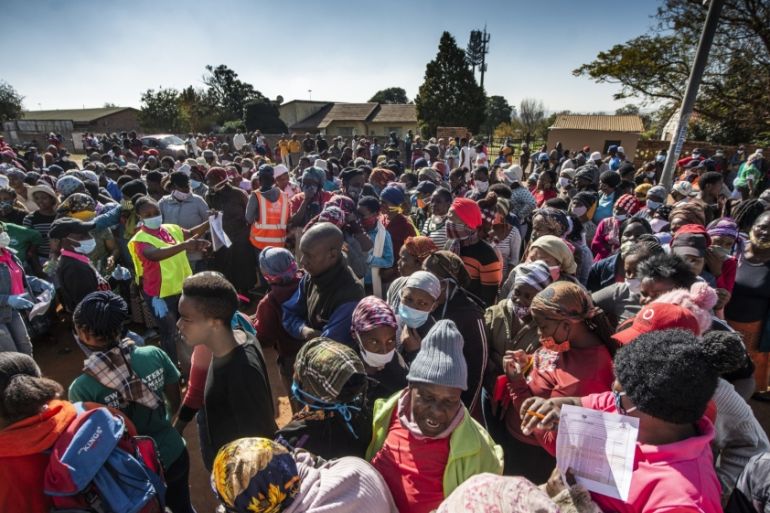South Africa heading towards becoming a failed state: Report
Risk consultancy blames apartheid-era laws for high inequality and post-independence gov’ts for failing to create jobs.

South Africa faces a precipitous economic and political collapse by 2030 unless it changes its economic model and implements growth-friendly policies, according to Eunomix Business & Economics Ltd.
Using a range of measures, the Johannesburg-based political and economic risk consultancy forecasts the country will rank near the bottom of a table of more than 180 countries in terms of security, similar to Nigeria and Ukraine, and have prosperity akin to Bangladesh or Ivory Coast. That’s a significant decline from its current position, though it should fare better on governance and welfare measures.
Keep reading
list of 4 itemsThirty years waiting for a house: South Africa’s ‘backyard’ dwellers
Photos: Malnutrition threatens future Afghan generations
From prisoner to president in 20 days, Senegal’s Diomaye Faye takes office
“Bar a meaningful change of trajectory, South Africa will be a failed state by 2030,” Eunomix said in a report.
The consultancy blames a structure created during the White-minority apartheid era that was designed to exclude the Black majority, creating one of the world’s most unequal societies. Since the advent of democracy in 1994, the ruling African National Congress perpetuated that situation by rejecting job-intensive growth policies and instead raising wages and subsidizing the poor through welfare, Eunomix said.
While less than a quarter of the population is in work, South Africa’s wage bill as a percentage of gross domestic product significantly exceeds that of countries such as India, Thailand and the Philippines.
‘Dual Track’
Eunomix’s recommendation for South Africa’s government is to adopt a “dual-track” strategy of developing and maintaining high levels of social support and paying for it by adopting an aggressive special economic zone policy, which boosts growth and employment, albeit at lower wages.
The ANC’s strategy is “a dichotomy born of apartheid, resistance and crystallized by ideological puritanism and entrenched interests,” the consultancy said. “The country should not choose between imagined opposites. It should adopt a dual-track approach that reconciles them.”
President Cyril Ramaphosa is “very clear” about the need for inclusive growth that addresses inequality, unemployment and poverty, his spokesman Tyrone Seale said by phone on Wednesday.
“Government, business, labor and communities are currently working on an economic recovery plan,” he said. “As South Africa we are clear about our plan to reboot the economy and the need to involve all South Africans.”
Former President Jacob Zuma ushered in a decade of low growth when he focused on increasing the role of the state, instead of supporting a private-sector led recovery after the global economic crisis of 2008, Eunomix said. Prolonged policy uncertainty in areas ranging from mining to telecommunications compounded the slowdown.
The economic impact of recurrent power cuts, rising unemployment and the loss of the last investment-grade rating on South Africa’s debt have only been exacerbated by the coronavirus outbreak.
“The pandemic is the last nail in the coffin of strategic fiasco,” Eunomix said. “The economy is unsustainably narrow and shallow. It rests on a small and declining working population burdened by very high debt and taxes.”